 MyDogBreeds
MyDogBreeds Perro de Presa Canario is originated from Spain but Alaskan Husky is originated from United States. Perro de Presa Canario may grow 10 cm / 4 inches higher than Alaskan Husky. Perro de Presa Canario may weigh 45 kg / 100 pounds more than Alaskan Husky. Perro de Presa Canario may live 3 years less than Alaskan Husky. Both Perro de Presa Canario and Alaskan Husky has almost same litter size. Both Perro de Presa Canario and Alaskan Husky requires Low maintenance.
Perro de Presa Canario is originated from Spain but Alaskan Husky is originated from United States. Perro de Presa Canario may grow 10 cm / 4 inches higher than Alaskan Husky. Perro de Presa Canario may weigh 45 kg / 100 pounds more than Alaskan Husky. Perro de Presa Canario may live 3 years less than Alaskan Husky. Both Perro de Presa Canario and Alaskan Husky has almost same litter size. Both Perro de Presa Canario and Alaskan Husky requires Low maintenance.
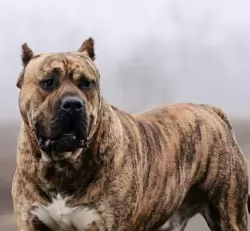 This large dog, also known as the Canary Mastiff, is a rare Molosser-type dog hailing from the Canary Islands.
This large dog, also known as the Canary Mastiff, is a rare Molosser-type dog hailing from the Canary Islands.
It does appear as if, according to records, that these dogs were also consumed at one time. The dog has also been used as a cattle dog as well as being used for dog fighting till the middle of the 1900s. Dog fighting was prohibited in the 1940s but it continued for a number of decades.
As people became interested in other dog breeds, the Presa nearly died out but some breeders revived the breed because of it having some good characteristics – territorial, brave, protective and intelligent. The FCI recognized the dog in 2011.
 Alaskan Husky is created to be a working dog who can do many different jobs like hauling logs, transport, supplies delivery, racing dogs, etc. Mushers created this breed. Alaskan Husky is created as a mix of Inuit dog, Siberian Husky, Greyhound and German pointers, and it is very difficult to find pure breed Alaskan Husky, and they are not recognized by any Kennel club.
Alaskan Husky is created to be a working dog who can do many different jobs like hauling logs, transport, supplies delivery, racing dogs, etc. Mushers created this breed. Alaskan Husky is created as a mix of Inuit dog, Siberian Husky, Greyhound and German pointers, and it is very difficult to find pure breed Alaskan Husky, and they are not recognized by any Kennel club.
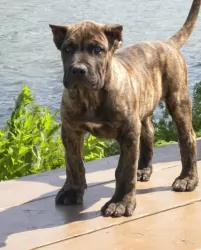 The Perro de Presa Canario or Canary Dog is large and muscular. He stands at 58 to 66cm in height and weighs anything from 40 – 70kg. He has a deep bark.
The Perro de Presa Canario or Canary Dog is large and muscular. He stands at 58 to 66cm in height and weighs anything from 40 – 70kg. He has a deep bark.
The head is broad and the ears are normally cropped to give him a more aggressive appearance. With ear cropping being banned the ears are close fitting to the head and are floppy. This is one of those dogs where the rear of the dog is slightly higher than the shoulders.
The coat is short and there is no undercoating. It is available in all different shades of fawn and brindle. The breed standard requires the dog having a black mask.
Canine experts tell us that this large working dog has got such fearless guardian characteristics that they wouldn’t recommend this dog for first time dog owners. On the other hand however, there are dog owners who claim that with good socialization, this dog becomes docile and amicable around their human family.
He is a clever dog so training and socialization will be easy and it will be worth it. This is a dog noted for its strength, it’s strong personality and potential for aggression, so training and socialization will be most important.
 Alaskan Husky average weight depends from dog to dog, but on average male weights 21-25kg, while their height is moderate size. Females are slightly smaller than males, and they can weight 17-19kg.
Alaskan Husky average weight depends from dog to dog, but on average male weights 21-25kg, while their height is moderate size. Females are slightly smaller than males, and they can weight 17-19kg.
A lifespan of Alaskan Husky depends, again, from dog to dog, but it is 10-15 years. Of course, if you are taking care of your dog, they can live much longer.
Litter Size of average female is 4-10 puppies.
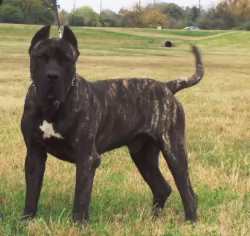 Contrary to what many people think, the Perro de Presa Canario can be a calm, gentle dog when trained and socialized properly.
Contrary to what many people think, the Perro de Presa Canario can be a calm, gentle dog when trained and socialized properly.
It is only when you bring an older, unknown dog into your midst that you would have to exercise caution with him as he can then be aggressive.
Dogs become dangerous and aggressive when they are brought up by aggressive, uncaring people. Humans are always to blame for the way a dog turns out. Provide this large dog with a loving, caring home, and he’ll show you what a remarkable pet he can be.
 Alaskan Husky is the best dog for the active people or families. They are bred to be working dogs. This breed is not created for it looks or pedigree, but this breed is bred purely to help with various tasks. They love being around the family, and they are very happy and cheerful. Alaskan Husky is not good watchdogs because they love everyone, including strangers. They are highly intelligent breed, but it can be tricky to train them sometimes. You must be a leader who makes decisions because if you are not confident, they will not see the reason for listening to you. The best way of training your dog would be with patience and firm, decisive manner. The old-fashioned way of training that includes punishment is not recommendable. They do not respond well to that. Training with awards is the best way to teach your dog. Alaskan Husky is a very active dog, so they are not very good for apartments. Although, you can have them in apartments but only if they have active walks and exercises. They love jogging, and they can be excellent buddies in any activity. They will love all the animals but it is important for them to socialize from the early age.
Alaskan Husky is the best dog for the active people or families. They are bred to be working dogs. This breed is not created for it looks or pedigree, but this breed is bred purely to help with various tasks. They love being around the family, and they are very happy and cheerful. Alaskan Husky is not good watchdogs because they love everyone, including strangers. They are highly intelligent breed, but it can be tricky to train them sometimes. You must be a leader who makes decisions because if you are not confident, they will not see the reason for listening to you. The best way of training your dog would be with patience and firm, decisive manner. The old-fashioned way of training that includes punishment is not recommendable. They do not respond well to that. Training with awards is the best way to teach your dog. Alaskan Husky is a very active dog, so they are not very good for apartments. Although, you can have them in apartments but only if they have active walks and exercises. They love jogging, and they can be excellent buddies in any activity. They will love all the animals but it is important for them to socialize from the early age.
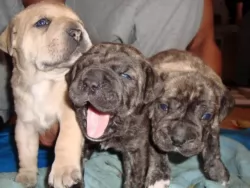 The Perro de Presa Canario can live to be between 8 and 12 years of age. Being a large breed the dog can be susceptible to hip dysplasia and other problems such as cancer and heart problems. It is highly unlikely that a well cared for dog will get any of these illnesses.
The Perro de Presa Canario can live to be between 8 and 12 years of age. Being a large breed the dog can be susceptible to hip dysplasia and other problems such as cancer and heart problems. It is highly unlikely that a well cared for dog will get any of these illnesses.
It is far better to give your dog two smaller meals a day as opposed to one bigger meal as then he tends to wolf his food down. This can lead to bloat, where the stomach swells up and worse, it twists. This dangerous situation prevents fluid and air from escaping the stomach. Your dog is restless, he paces and salivates, wanting to vomit. Bloat can affect any dog at any age.
Kidney disease can develop because of some other illness or it can develop on its own. It can even be caused by bad teeth when bacteria enters the bloodstream of the dog.
 This breed has no any specific health issues. However, as any breed they can develop some issues that are related to genetics. It is very important to discuss with owners that you are getting the dog from, and if they are not ready to show medical records or proofs that dogs are healthy then you should be extra careful. If you do not have a lot of experience in getting a puppy or an adult dog, you should bring someone who has more experience. Again, this breed is very healthy and if you give them adequate caring with regular vet checks you will have a healthy and a happy dog for a long time.
This breed has no any specific health issues. However, as any breed they can develop some issues that are related to genetics. It is very important to discuss with owners that you are getting the dog from, and if they are not ready to show medical records or proofs that dogs are healthy then you should be extra careful. If you do not have a lot of experience in getting a puppy or an adult dog, you should bring someone who has more experience. Again, this breed is very healthy and if you give them adequate caring with regular vet checks you will have a healthy and a happy dog for a long time.
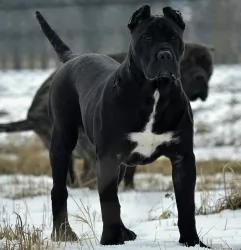 This is a short haired dog, and he isn't a heavy shedder so beyond regular twice-a-week brushing he will simply need to have his eyes and ears checked for infections.
This is a short haired dog, and he isn't a heavy shedder so beyond regular twice-a-week brushing he will simply need to have his eyes and ears checked for infections.
He will also need to have his nails clipped and to check his teeth over too. A sore, bad tooth at the back of your pet’s mouth can cause terrible pain but also play havoc with his general health.
Your Perro de Presa Canario is a high-energy dog and he will need daily exercise. He will love a good walk but he will also need something more strenuous and demanding such as ball- and rope tug-of-war games.
Try and provide your large pet with a top quality commercially manufactured food – one that is packed with vitamins and minerals instead of colorants preservatives and toxic fillers.
Break the monotony of feeding him only kibble by mixing in some cooked chicken, brown rice, sweet potato, carrots and spinach. Dogs love consistency and simplicity and simple meals like this with some raw meat thrown in occasionally will keep him healthy and happy. Never leave him without a constant supply of fresh, cool water.
 Feeding Alaskan Husky, or basically any other dog depends on how active your dog is, and how big it is. Basically, if it is big and very active you will have to give it more food. On average, Alaskan Husky can eat 3-4 cups of high-quality dry food and that should be enough to keep them well-fed and healthy. You can always add vegetables, oil or fruits in their meal, but first, consult which additional food is the best for your dog. Carrots, broccoli, apples are always a good treat for any pet.
Feeding Alaskan Husky, or basically any other dog depends on how active your dog is, and how big it is. Basically, if it is big and very active you will have to give it more food. On average, Alaskan Husky can eat 3-4 cups of high-quality dry food and that should be enough to keep them well-fed and healthy. You can always add vegetables, oil or fruits in their meal, but first, consult which additional food is the best for your dog. Carrots, broccoli, apples are always a good treat for any pet.
Puppies eat more than an adult dog, so it would be perfect if you can divide small portions of food 3-5 times per day. It will help them develop into perfectly healthy adult dogs.
They are not very difficult to groom. Overall, Alaskan Husky does not need any special care, except twice a year during shed season. Then you have to brush them with a metal comb every day, but overall, occasional brushing and bathing when it is necessary is more than enough to have a healthy and perfectly groomed pet.